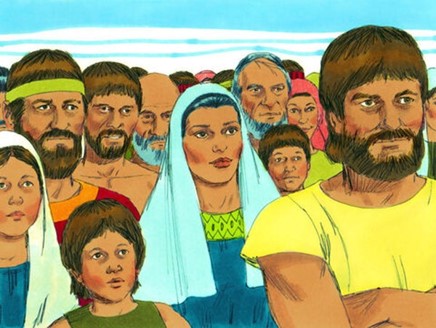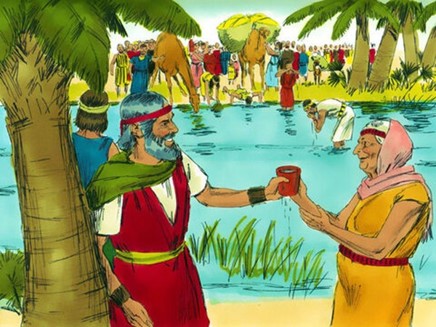Good morning!
Greetings in the name of the father, the son, and the Holy Spirit.
“I will sing to the LORD,
for he has triumphed gloriously;
he has hurled both horse and rider
into the sea.
The LORD is my strength and my song;
he has given me victory.
This is my God, and I will praise him—
my father’s God, and I will exalt him! (Exodus 15:1b-2)

Israelites rejoiced over what God had done to the Pharaoh’s army and praised Him with the loudest voice. They saw the bodies of the Pharaoh’s army washed to the shore. They realized that there would be no more slavery under the Egyptians. God utterly destroyed the Pharaoh’s army, the best Egyptian army, and the Red Sea through which they walked returned and separated them from the Egyptians. It was the day truly liberated.
Then they walked for three days through the desert. They suffered without water, and the excitement of crossing the Red Sea had been completely eroded. They kept searching for water but could not find it for three days. Then they spotted an oasis and thought the suffering would be over. But it was not the case. The water was too bitter to drink. Although they were thirsty, their thirst was not enough to make them drink the water due to the bitter taste. They complained and demanded sweet water, not bitter water.
God made the water sweet to their taste using truly humble and faithful Moses because God loved them. Indeed God always loved them under all circumstances because they were His beloved children. Indeed, their picky behavior was sinful to God. Even worse, they directly complained to God. How about us? Can we see ourselves mirrored in the Israelites by being picky and demanding God to fit into our taste?
Indeed, not because they were faithful to God, but because God was faithful to them always, God made the water sweet for them to drink. This is God’s unfathomable love, which is unconditional, always, and never ceasing. Despite their sin of complaining to God, God made them fully satisfied with the sweet water tasting good in their mouths.

But God is also righteous. God again used Moses and set before them the following decree as a standard to test their faithfulness to him. God said,
“If you will listen carefully to the voice of the LORD your God and do what is right in his sight, obeying his commands and keeping all his decrees, then I will not make you suffer any of the diseases I sent on the Egyptians; for I am the LORD who heals you.” (Exodus 15:25b-26)
God taught them –listen and obey. Not just being a hearer, but a careful listener to the voice of the LORD [God’s name] and “your” God, who dearly loved the Israelites.
Let’s think about the fact — God is the creator of the universe and our Ever-Loving Father. What does this really mean? Does this mean all things happening in our lives by Him and in His love?
To our eyes, many things are randomly coming into our lives whether we choose or not. Some of them are good, and some are bad to our taste, like the bitter water found in the oasis, but all things are from God. It is the truth, and God loves us as His beloved children.
Although we give the best to our children, when our children complain to us, as parents, how painful an experience was it? It was a heartbreaking moment. But we also know why. Our children complain because they don’t know how to appreciate our life for them. They are still babies who do not know left and right. They just judge things by their taste. Even so, we love them. Sometimes, we give them what they want, although it is not the best because they are just crying and waning. They need to grow and mature, but we sometimes pacify them to stop their complaints while only hoping they can grow and mature quicker because what they got is only hurting them later, although they enjoy it now.
When we look back, haven’t we experienced what looked good became bad and a pain point in our lives? Let’s say if the Israelites accepted the bitter water with thanksgiving, then what would be the rest of the story of the Israelites? We cannot speak for God, but God would take them directly to the Promised Land because they were mature enough to occupy it. Without mature faith, occupying Promised Land is meaningless because the land truly challenges and requires true faith in God.
Thus, God pampered the Israelites and made them fully satisfied. Again, not because they were faithful, but because God was faithful. We often misunderstand. We think we did something good to God when we got something good. As we can see here, it is not true. Regardless of the Israelites’ behaviors, God gave them good according to God’s absolute goodness.

Thus, it is true that God always provides the best to each of us under all circumstances, but we are picky about what we receive from God by examining things from God with our own eyes. Then we make up our minds – good or bad – from a myopic view without knowing the big picture of why those things are happening in our lives, especially without knowing what’s coming next.
Believing many of us have already heard:
There is a Taoist story of an old farmer who had worked his crops for many years. One day his horse ran away. Upon hearing the news, his neighbors came to visit. “Such bad luck,” they said sympathetically.
“Maybe,” the farmer replied.
The next morning the horse returned, bringing with it three other wild horses. “How wonderful,” the neighbors exclaimed.
“Maybe,” replied the old man.
The following day, his son tried to ride one of the untamed horses, was thrown, and broke his leg. The neighbors again came to offer their sympathy for what they called his “misfortune.”
“Maybe,” answered the farmer.
The day after, military officials came to the village to draft young men into the army. Seeing that the son’s leg was broken, they passed him by. The neighbors congratulated the farmer on how well things had turned out.
“Maybe,” said the farmer.
The above story makes us think. The story tells us we don’t know what is really good and bad at the moment because the future is unknowable. The farmer knew this secret, but the neighbors didn’t.
Who knew a runaway horse would bring three other horses? His neighbors praised the three wild horses brought by the lost horse, but his son broke his leg when he fell from one of the wild horses as trying it out. His neighbors thought a bad thing had happened, and they even gave sympathy. But the following day, military officers came to draft young men into the army. His son was exempt because of his broken leg.
How do we respond to good things or bad things in our lives? Haven’t we rejoiced because something good has happened? Or haven’t we been depressed because something bad has happened? According to the story, we should not be delighted or depressed because of good and bad things. After all, a bad thing can follow a good thing, and a good thing can follow a bad thing.
Thus, the story concludes with “Maybe.” Surely, it gives us wisdom in looking at everything in perspective. But the wisdom in the story ends here.
If we think carefully about the story, it implicitly suggests that our life is a just product of a sequence of “Maybe”s, and the cycle of “Maybe”s never ends. How should we feel if our life is a product of the never-ending alternation of good and bad? Are we trapped in the never-ending “Maybe” yo-yo cycle?
Absolutely not! The story missed the one greatest truth: our life is not simply composed of a never-ending cycle of “Maybes”s. The real truth is there is a purpose from God, who dearly and always loves us because of the only fact that we are God’s most precious and beloved children. If so, will God let us be trapped in the never-ending cycle of “Maybe”s? Again, the answer is no.
Thus, Bible says
Rejoice always, pray continually, give thanks in all circumstances; for this is God’s will for you in Christ Jesus. (1 Thessalonians 5:16-18)

We know the truth that we are God’s children, and Our God is our Ever-Loving Father. Then what should be our perspective on the things happening in our lives, good or bad? Yes, we should always rejoice, pray continually by telling our love to our Ever-Loving Father, and give thanks to our Heavenly Father. Our Ever-Loving Heavenly Father never misses even one second or one inch (or one centimeter), and he exactly times for and places us in the right time and place for us in His love.
Then what shall we do? Whether we got something bitter or sweet to our taste, our response to our God shouldn’t be “Maybe” but thanksgiving to God, our Ever-Loving Heavenly Father. Thus, Bible says,
Do not be anxious about anything, but in every situation, by prayer and petition, with thanksgiving, present your requests to God. And the peace of God, which transcends all understanding, will guard your hearts and your minds in Christ Jesus. (Philippians 4:6-7)
Although something bad or even a disaster happens, we should not be anxious. Instead, we should fix our eyes on God and talk to God in prayer, who is anxiously waiting for our prayers to listen to our contrite voice from the deepest part of our hearts because God dearly loves us. Again, something happening in our lives is not random events as portrayed by the above endless yo-yo “Maybe”s in the story without any aim or purpose. It is the very manifestation of God’s love.
Sure, we cannot explain many things happening on earth. Then please remember God loves us, but we are prone to judge things with our own eyes. Even the wisdom captured in the story is wise but has not reached the true God’s wisdom and His love. Here is our story: “Don’t judge things with our own eyes although a bad thing is coming into our life, because it is not bad but the best that God has provided us. It is a prelude to even greater blessings, and God is preparing us for what God is about to bring into our lives next. In God, there is no never-ending sequence of yo-yo “Maybe”s, which does not give anyone any assurances or purpose.
Then should be our answer to bad things coming into our lives? (Indeed, God never gives one single bad thing to us. It only doesn’t look good because we use our own eyes.) Here is the real answer from Bible:
Consider it pure joy, my brothers and sisters, whenever you face trials of many kinds, because you know that the testing of your faith produces perseverance. Let perseverance finish its work so that you may be mature and complete, not lacking anything. (James 1:2-4)
Yes, if a bad thing comes into our lives, we consider it pure joy while trusting in God and expecting to get something Godly good in the future. The secret of a bad thing (or our trail) in our lives is an opportunity to know, experience, and appreciate God to grow deeper and fully mature in faith.
Moses had walked with God for forty years in the Midian wilderness. Falling from the towering prince in Egypt to becoming a fugitive wandering around in the noman’s land to keep alive was a devastating blow to Moses. Still, God kept walking with Moses with God’s special care and love. Of course, Moses’ life in the Midian wilderness was not the life in the palace, but Moses gained a far more precious thing in his life – his absolute humility before God in faith. Moses became truly mature, and he could do all things in faith in God by trusting in Him and being calm before Him. In his maturity in faith, Moses liberated the Israelites from the hand of Pharaoh, the king of Egypt. He kept remaining faithful to God when two million Israelites complained to God. One Moses vs. two million Israelites, but Moses prevailed in faith because Moses was not alone. He was with God, and God was with him. In God, what couldn’t Moses do?
Let’s go back to the Israelites who complained to God because the water was bitter. The water did not fit their taste. Their immaturity in faith in God was so obvious even to us. Even so, God made them fully satisfied. Then God told them what they should do. Like our children, they said, “Yes, we will do as God said.” But they couldn’t do it.
Only a few days later, they again complained to God for food. Why? They were hungry in the middle of the wilderness. If we were there, how would we have behaved? The food which we brought was almost running out, and they were in the middle of the barren wilderness. Then they quickly jumped to the worst conclusion they could make without trusting God. They believed they would starve to death.
What had God done for the Israelites when they thought they would die out of dehydration without water in the middle of the desert? God gave them water, although they complained to God.

Three days before, they also complained to God. They were trapped between the Pharaoh’s army and the Red Sea. They thought they would die by being killed by the Pharaoh’s army, and they complained to God. But God made a path through the Red Sea. They walked through the Red Sea, and God buried the chasing Pharaoh’s army deep into the Red Sea by returning the water. How many times did they need to experience God’s miracles, mercies, and forgiveness in their lives?
How about us? Let’s look back at our lives. Haven’t God opened a path through the Red Sea when we thought that we were absolutely trapped and there was no way to get out of our life problems? Haven’t God provided for us when we thought we had no means to get what we needed to go through the day?
What should be our answer then before all our life challenges? Consider each one pure joy because God specially gives us a new and excellent opportunity to know and experience Him more and to go into a deeper relationship with Him to be fully mature in Him. Then we will be in true peace by being one with God. Therefore, we must always rejoice, pray continually (talk to Our Ever-Loving Heavenly Father), and give thanks to God, which is the only will of God in Christ Jesus.
We are praying for you for God’s blessings, protection, and guidance and to be filled with God’s mercy and love while enjoying true peace that only comes from Ever-Loving God, who loves us unconditionally, always, and forever.

The Lord bless you and keep you; the Lord make his face shine on you and be gracious to you; the Lord turn his face toward you and give you peace. (Numbers: 6:24-26)
